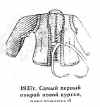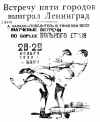| |
V. S. Oschepkov was born on
Sakhalin island in 1892. As an orphan child he went to school in Japan at the
Russian Orthodox (pravoslavie) mission of Saint Nicolas. He also studied Judo at the
Kodokan Institute where he received his black belt from Jigoro Kano himself.. He was the
first non-Japanese to obtain a black belt in Judo from the Kodokan Judo Institute.
Official Kodokan files
indicate that he:
- registered on October 29, 1911
- obtained his 1st dan of Kodokan on June 15, 1913 and
- obtained his 2nd dan of Kodokan on October 4, 1917.
As a young adult he
traveled around and learned various wrestling and self-defense techniques, which he
incorporated in a system that gave birth to a practical "self defense without
weapon;" recognized and called SAMBO (SOMBO) on November 16, 1938.
Oschepkov developed a
sport wrestling style that went beyond Judo taking many aspects from various styles within
the USSR but also from styles like French wrestling style. He did the same for the more
typical self-defense. He taught and trained sports men during the highlight of his brief
career at the "Dinamo" society ( a training place for state security officers)
and school for the militia. He also taught on the Moscow Institute for Physical Culture.
He devised breakthrough programs not only of self-defense, hand-to-hand combat, sport
wrestling, but also was innovative in developing systems of physical education to prepare
specifically for wrestling throws and techniques.
The history of Sambo is
not without some darker sides even in its early ages.
The Leningrad Sport Committee abolished the competition between Leningrad's and Moscow's
wrestlers, organized by Oschepkov. The regime of those days did not want to recognize the
part Japanese JUDO played in the new wrestling style (which was not called
"sambo" yet.) They actually wanted to strike every reference to Judo. Oschepkov
wrote sharp letters to the All-USSR Sport Committee, Army's Inspection of Physical Culture
and Sport, in Moscow, Leningrad, Ukraine and Beyond-Caucasus Institutes of Physical
Culture.
In 1937 the entire country was under the pressure of nightly arrests. The slogan
"better to arrest ten innocent then to miss one spy" was the
basis for the inner security service of that year. The criteria of criminal unreliability
was very simple: man had to be arrested if he made foreign travel or had relatives or
friends in other countries. Oschepkov belonged to this category. At September, 29
the decree read: "Oschepkov Vasilii Sergeevich is sufficiently unmasked as Japanese
spy... citizen Oschepkov is prosecuted due to clause 58 article 6". In the night of
October 1, 1937 he was arrested in his home.
He was wrongly accused of being a Japanese spy. Ten days after his arrest he died in
rather obscure circumstances at the age of 44 years.
Khalampiev, distanced himself from his former teacher Oschepkov. He claimed himself
creator and innovator of the new wrestling style.
After the World War II Anatolii Arcadievich Kharlampiev became the only leader of sambo.
He certainly has merits, but his dignity as a human was
not as high as his quality as a professional. Even after Oschepkov's name was cleared,
Kharlampiev did not tell the truth about sambo's origin. He did not give his teacher his
due recognition. On the contrary he developed his own myth. He began to say that he was
ordered to create sambo by N.I.Podvoiski, hero of revolution in 1922. But in 1922 A. A.
Kharlampiev was only 15 years old.
The above article consist of edited and shortened excerpts of an article by
Michail LUKASHEV (I'll try to get more info on this author's books and researches.)
More information about Oschepkov will be presented.
Other names connected to
the early days of Sambo will be presented:
Anatolii Kharlampiev
V. A. Spiridonov
E. M. Chumakov |
| Kharlampiev gives explanations. |
Kharlampiev does a throw on Budzinski. |
Kharlampiev's students sparring. |
Kharlampiev together with his assistent
trainers: Nevedomski, Budzinski, and Sazonov. |

The very first sambo kurkta
(jacket) design: 1937 |

24 December 1937
Match
Moscow - Leningrad
in Free Style Wrestling
JU-DO
[Note that the term "SAMBO" is not used yet
also for the next poster in 1938, however no mantion of the term "Judo"
any more.] |

Competition of Five Cities
won by Leningrad
Free Style Wrestling
(Bor'be BOL'NOGO STILYA)
28-29 November 1938 City of BAKU |